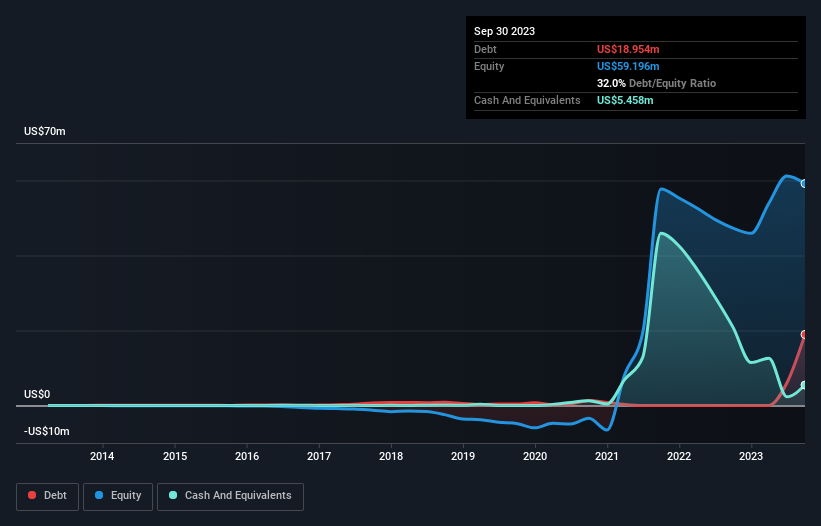- United States
- /
- Metals and Mining
- /
- NasdaqCM:ABAT
American Battery Technology (NASDAQ:ABAT) Is Making Moderate Use Of Debt
David Iben put it well when he said, 'Volatility is not a risk we care about. What we care about is avoiding the permanent loss of capital.' So it might be obvious that you need to consider debt, when you think about how risky any given stock is, because too much debt can sink a company. As with many other companies American Battery Technology Company (NASDAQ:ABAT) makes use of debt. But the real question is whether this debt is making the company risky.
Why Does Debt Bring Risk?
Debt is a tool to help businesses grow, but if a business is incapable of paying off its lenders, then it exists at their mercy. If things get really bad, the lenders can take control of the business. While that is not too common, we often do see indebted companies permanently diluting shareholders because lenders force them to raise capital at a distressed price. By replacing dilution, though, debt can be an extremely good tool for businesses that need capital to invest in growth at high rates of return. When we think about a company's use of debt, we first look at cash and debt together.
Check out our latest analysis for American Battery Technology
How Much Debt Does American Battery Technology Carry?
The image below, which you can click on for greater detail, shows that at September 2023 American Battery Technology had debt of US$19.0m, up from none in one year. However, it also had US$5.46m in cash, and so its net debt is US$13.5m.

A Look At American Battery Technology's Liabilities
The latest balance sheet data shows that American Battery Technology had liabilities of US$23.0m due within a year, and liabilities of US$1.71m falling due after that. Offsetting this, it had US$5.46m in cash and US$1.50m in receivables that were due within 12 months. So its liabilities outweigh the sum of its cash and (near-term) receivables by US$17.8m.
Since publicly traded American Battery Technology shares are worth a total of US$175.0m, it seems unlikely that this level of liabilities would be a major threat. Having said that, it's clear that we should continue to monitor its balance sheet, lest it change for the worse. The balance sheet is clearly the area to focus on when you are analysing debt. But ultimately the future profitability of the business will decide if American Battery Technology can strengthen its balance sheet over time. So if you want to see what the professionals think, you might find this free report on analyst profit forecasts to be interesting.
Given its lack of meaningful operating revenue, investors are probably hoping that American Battery Technology finds some valuable resources, before it runs out of money.
Caveat Emptor
Importantly, American Battery Technology had an earnings before interest and tax (EBIT) loss over the last year. Its EBIT loss was a whopping US$25m. Considering that alongside the liabilities mentioned above does not give us much confidence that company should be using so much debt. Quite frankly we think the balance sheet is far from match-fit, although it could be improved with time. Another cause for caution is that is bled US$31m in negative free cash flow over the last twelve months. So in short it's a really risky stock. There's no doubt that we learn most about debt from the balance sheet. But ultimately, every company can contain risks that exist outside of the balance sheet. For example, we've discovered 5 warning signs for American Battery Technology (3 are a bit concerning!) that you should be aware of before investing here.
If, after all that, you're more interested in a fast growing company with a rock-solid balance sheet, then check out our list of net cash growth stocks without delay.
New: Manage All Your Stock Portfolios in One Place
We've created the ultimate portfolio companion for stock investors, and it's free.
• Connect an unlimited number of Portfolios and see your total in one currency
• Be alerted to new Warning Signs or Risks via email or mobile
• Track the Fair Value of your stocks
Have feedback on this article? Concerned about the content? Get in touch with us directly. Alternatively, email editorial-team (at) simplywallst.com.
This article by Simply Wall St is general in nature. We provide commentary based on historical data and analyst forecasts only using an unbiased methodology and our articles are not intended to be financial advice. It does not constitute a recommendation to buy or sell any stock, and does not take account of your objectives, or your financial situation. We aim to bring you long-term focused analysis driven by fundamental data. Note that our analysis may not factor in the latest price-sensitive company announcements or qualitative material. Simply Wall St has no position in any stocks mentioned.
About NasdaqCM:ABAT
American Battery Technology
Operates as a battery materials company in the United States.
Medium-low risk with adequate balance sheet.
Similar Companies
Market Insights
Community Narratives



